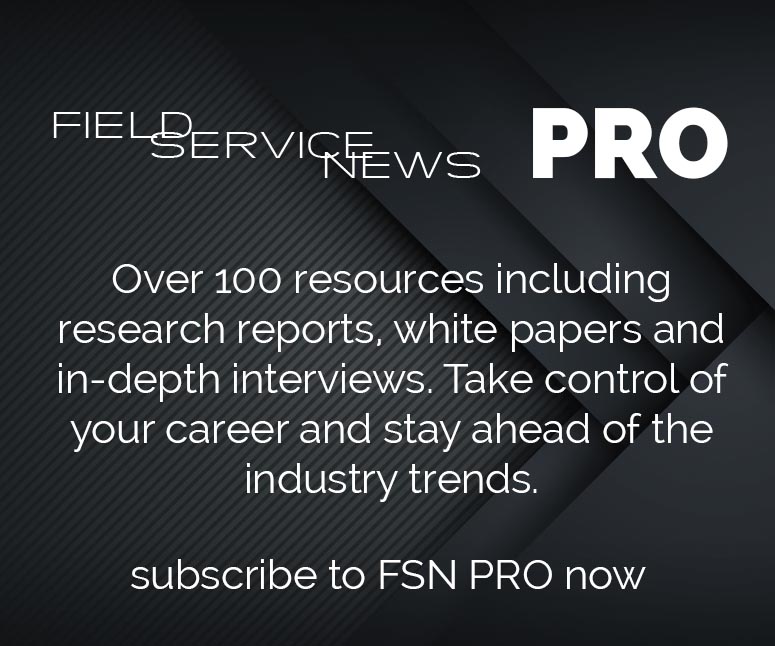Speaking exclusively to Field Service News ServiceMax COO Scott Berg has discussed the similarities between widely differing industries, the rapid rise of ServiceMax and why the IoT hasn’t quite got fully up to speed as yet which we featured in the first part of this interview.
In the second part we saw just why Berg believes the field service software specialists are in pole position to deliver the much promised benefits of Big Data to field service and why their relationship with Salesforce has evolved to a more equal footing.
However, whilst not afraid to identify the strong position ServiceMax have established, of which he is clearly proud. He also goes to great pains not to diminish the respect and thanks he has for Salesforce.
“I can’t say enough about what an enabler it was.” He adds quickly “ For a company like us, and I’ve been there six years, we should be nowhere by now. We should have just blown the first three years just trying to get this thing running and begging to get those first twelve customers.” He says only half joking.
“Here we are getting a hundred and something customers a year. And 40 a quarter so I think it has been a really unique experience because of that.”
Of course whilst things have panned out rather nicely for Berg and the ServiceMax team, with such a close alliance there was always the danger that unless if they didn’t evolve their own IP as swiftly as they have that their rapid rise to prominence could have been stunted, with the company being dismissed as simply an add on for Salesforce.
Was this part of their thinking when they took such an aggressive development path, was it always a case of needing to establish their own clear identity within a specific timeframe?
“I don’t know that we thought about it deliberately that way but I think its sort of ended up that way in hindsight.” Explains Berg
[quote float=”left”]I think honestly what we were responding to was the demand of the market. Our focus, our mission has really been about that field service engineer, that end user, the guy in the van or on the end of that ladder so that drove us to do some things that Salesforce wouldn’t do[/quote] “I think honestly what we were responding to was the demand of the market. Our focus, our mission has really been about that field service engineer, that end user, the guy in the van or on the end of that ladder so that drove us to do some things that Salesforce wouldn’t do like offline data synchronisation, and the kind of configurable process that you could run across a variety of devices and schedule optimisation. Mathematical optimisation is not really a feature of the Salesforce website so I think its really user driven demand”
He pauses a moment before continuing “But then you can look back on it and say wow we built all that stuff because we really needed to. It just so happens that is fairly independent intellectual property value specific to our market.”
This focus on the engineer brings us onto another topical and somewhat controversial topic, namely wearable computing.
“We’ve been working for several months now on a Google Glass prototype, and showed it around a couple of our smaller user groups.” Berg begins when I ask him if the advent of Saleforce Wear has spurred ServiceMax into developing solutions for wearable devices.
[quote float=”right”]We’ve been looking at Google Glass as a compliment to mobile phone apps, where you can get into a hands free series of procedures[/quote] “A lot of customers of ours are in safety conscious environments. Where there are lots of checklists, where the engineers are working in real hands-free, high risk environments. We’ve been looking at Google Glass as a compliment to mobile phone apps, where you can get into a hands free series of procedures, or check off certain standards, action the completion of certain tasks that is required for maintenance in regulated environments and things like that.” He adds.
But is there an interest amongst their client base for wearables at all?
“We’ve had a few projects around this and we’ve run it by a few customers.” Berg starts. “There is definitely a cool factor. Even looking at the various mobile devices its been kind of eye opening for us to identify what are each customer going to use these devices for? Let’s take Google Glass as an example, battery life is not outstanding, and many of the visual cues still involve tapping your temple to get it to do some things. So whilst the promise of a hands free, see what I see, remote eyes and ears kind of thing is out there, you’ve still got to think of the practical reality of how is somebody going to use this on a job site.”
“It’s been an educational process for us more than anything. How do these gadgets interplay with each other, in a course of a day?”
This of course has been one of the big challenges for the widespread adoption of wearables. Whilst the hyperbole that has surrounded such devices, particularly Glass has focussed on the devices as a replacement mobility tool, this is not how Berg sees it.
“I think it’s definitely a complimentary device, that’s the way that we see it. I don’t know if its going to be right for everybody any more than I could tell you everyone should use an android phone or everyone should use a tablet.”
[quote float=”left”]I think one of the things we’ve embraced smartly is we’re not going to be able to dictate to every customer how they want to operate,[/quote] For ServiceMax it seems that the emergence of wearables just means further ongoing developments for yet more platforms, which is just par for the course.
“I think one of the things we’ve embraced smartly is we’re not going to be able to dictate to every customer how they want to operate, so we’ve got a windows laptop version that works disconnected.” Berg explains
“This is a big deal in medical regulatory environments because they plug in peripherals and download diagnostics and reprogram cancer surgery equipment and things like that.”
“However, Coca-Cola said ‘look I want to take calls and log my work pretty simple work process – iPhone only.” He continues.
“I’ve got other customers that are deploying a number of devices. They’ve got laptops, they’ve got online web-presence and then they’ve deployed our iPad solutions as well. So I think they [wearables] are just another compliment and we need to be ready to make our experience happen across all of those because we won’t be able to dictate to people ‘oh yeah we’re the Google Glass guys and you have to do it this.”
For the time being I don’t think Berg and the team at ServiceMax need to worry about that. Infact I don’t think they need to be worried about being pigeon holed as anything other than ‘Oh yeah ServiceMax, they’re the guys that everyone seems to be talking about’.














